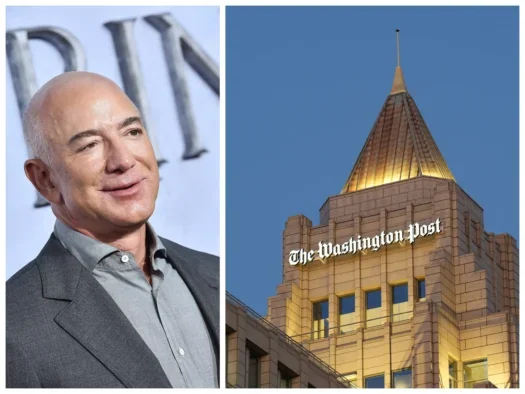[ad_1]

The decision by Washington Post owner Jeff Bezos not to endorse a candidate in the 2024 US presidential election could cost the paper more than $20m a year in lost digital subscriptions revenue.
The financial hit would mark a notable setback in Bezos’ attempts to make the paper profitable, which have already seen the title cut 10% of its workforce — some 240 roles — through voluntary buyouts.
NPR reported on Monday that 200,000 Post digital subscribers had cancelled since the publication’s chief executive, Will Lewis, wrote on Friday that the Post would not be making an endorsement. That figure “continued to grow on Monday afternoon”, the US public broadcaster added. The Post has not confirmed the figures.
The cheapest Washington Post subscription, All-Access Digital, costs $40 annually under a promotional discount, but would typically cost $120.
If all 200,000 of the cancelled subscriptions cost that much that would represent an absolute minimum of $8m a year in lost reader revenue and $24m at the full rate onto which the publisher would ultimately try and graduate subscribers. (This does not take into account that some of those subscribers would likely naturally cancel or churn out regardless.)
Lewis told Post staff in May that the Post had notched a $77m loss over the prior year and that its audience had declined 50% from its 2020 peak.
The Post does not disclose its subscriber numbers, but The Wall Street Journal reported in December 2022 that it had 2.5 million digital subscribers, a figure which had itself fallen by 500,000 in about two years. The same report said the Post had been on course to generate $600m in revenue in 2022.
Subscriptions have been central to Amazon founder Bezos’ plans to turn The Washington Post around. Lewis, who was hired by Bezos to oversee the Post in November, previously ran Wall Street Journal publisher Dow Jones during a period that saw the business paper’s subscriber figures nearly triple in six years to two million.
Lewis told Post staff earlier this year that he hoped to introduce two new subscription tiers, Post Plus and Post Pro — the latter targeted at businesses — to bolster reader revenue, alongside a foray into micropayments.
A Post report this week said subscriptions had been “ticking up ever so slightly” prior to the endorsement announcement.
[Read more: Spiked Washington Post election leader leaves CEO Will Lewis in a deep hole]
Why did The Washington Post not endorse anyone in the election?
The Washington Post’s editorial board had already drafted an endorsement of Vice President Kamala Harris when they were informed on Friday that the paper would not endorse either Harris or Donald Trump.
In a note published to the Post website, Lewis pitched the decision as a return “to our roots of not endorsing presidential candidates”. The title did not endorse any candidates prior to 1976, when it endorsed Jimmy Carter following the Watergate scandal, but has thrown its support behind a candidate at each election after 1988, when it declined to endorse Michael Dukakis.
Despite the note, Lewis and Post opinion editor David Shipley had earlier “privately made a case not to abandon the tradition so close to an election” to Bezos, according to The New York Times.
In an opinion article published to the Post website on Monday evening, Bezos added to Lewis’ explanation: “What presidential endorsements actually do is create a perception of bias. A perception of non-independence. Ending them is a principled decision, and it’s the right one.”
He also dismissed accusations that he had made the decision to protect his other business interests, Amazon and aerospace manufacturer Blue Origin.
“While I do not and will not push my personal interest, I will also not allow this paper to stay on autopilot and fade into irrelevance — overtaken by unresearched podcasts and social media barbs — not without a fight. It’s too important.”
What have staff said about the Bezos endorsement decision?
As of Tuesday, three members of the Washington Post’s ten-person editorial board had resigned, according to The New York Times, although all three are remaining at the Post in other capacities. Columnists Michele Norris, Robert Kagan and Danielle Allen have resigned from the paper altogether, and the opinion section has published a brief letter, signed by 21 of its columnists, calling the decision not to endorse “a terrible mistake”.
The publication has covered the story as it would turmoil at another paper: the non-endorsement was discussed in a news story about billionaires and chief executives “hedging their bets” ahead of a possible Trump win next week, and it has been the subject of a video by senior video reporter (and so-called “Tiktok guy”) Dave Jorgenson.
Here’s why some billionaires are going soft on Trump. pic.twitter.com/fn5jBsu5hF
— Dave Jorgenson (not JD Vance) (@davejorgenson) October 28, 2024
Former Post executive editor Marty Baron said the decision meant Bezos was “yielding to Trump’s pressure”, and Carl Bernstein and Bob Woodward, the former Post reporters who reported out the Watergate scandal, accused the owner of ignoring “the Washington Post’s own overwhelming reportorial evidence on the threat Donald Trump poses to democracy”.
Other staff have pleaded with the public not to abandon the Post’s journalism over the actions of its proprietor. One, columnist Karen Attiah, said on X: “Cancelling Washington Post subscriptions hurts journalists, editors and staffers, not our owner… Please don’t give up on us.”
White House economics reporter Jeff Stein, similarly, wrote on the platform that “there are precious few publications still doing the coverage — however incomplete; however still in need of improvement — aimed at serving the broader public at large. I believe The Washington Post is one of them”.
The post Washington Post’s non-endorsement could cost title $20m+ in lost online subs appeared first on Press Gazette.
[ad_2]
Source link


